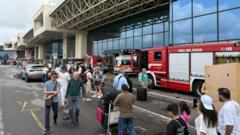Heathrow is among several European airports hit by a cyber-attack affecting an electronic check-in and baggage system.
The airport warned of possible delays due to a technical issue affecting software provided by Collins Aerospace to several airlines.
Brussels Airport said a cyber-attack on Friday night meant passengers were being checked in and boarded manually, while Berlin's Brandenburg Airport also reported longer waiting times due to the problem.
RTX, which owns Collins Aerospace, said it was aware of a cyber-related disruption to its system in select airports and that it was working to resolve the issue as quickly as possible.
The company added: The impact is limited to electronic customer check-in and baggage drop and can be mitigated with manual check-in operations. It said the attack hit its Muse software - which allows different airlines to use the same check-in desks and boarding gates at an airport, rather than requiring their own.
The BBC understands that British Airways is operating as normal using a back-up system, but that most other airlines operating from Heathrow have been affected.
Hundreds of flights have been delayed at the airports throughout Saturday, according to flight tracker FlightAware.
Lucy Spencer said she had been queuing to check in for a Malaysia Airlines flight for more than two hours, and that staff were manually tagging luggage and checking passengers in over the phone.
Another passenger, Monazza Aslam, said she had been sat on the tarmac for over an hour with no idea when we will fly, and had already missed her onward connection at Doha.
However, Luke Agger-Joynes said that while queues in Terminal 3 were much larger than normal, the airline for his US flight and the airport seem to be prepared and the queues are moving much faster than I feared.
Heathrow said additional staff were at hand in check-in areas to help minimize disruption.
Transport Secretary Heidi Alexander said she was aware of the incident and was getting regular updates and monitoring the situation.
While there are unfounded accusations circulating that this cyber-attack was carried out by Kremlin-sponsored hackers, it is far too early to know who is behind this attack. Some cyber-security experts suggested this could be a ransomware attack, noting that these can be perpetrated by state-sponsored actors as well.




















